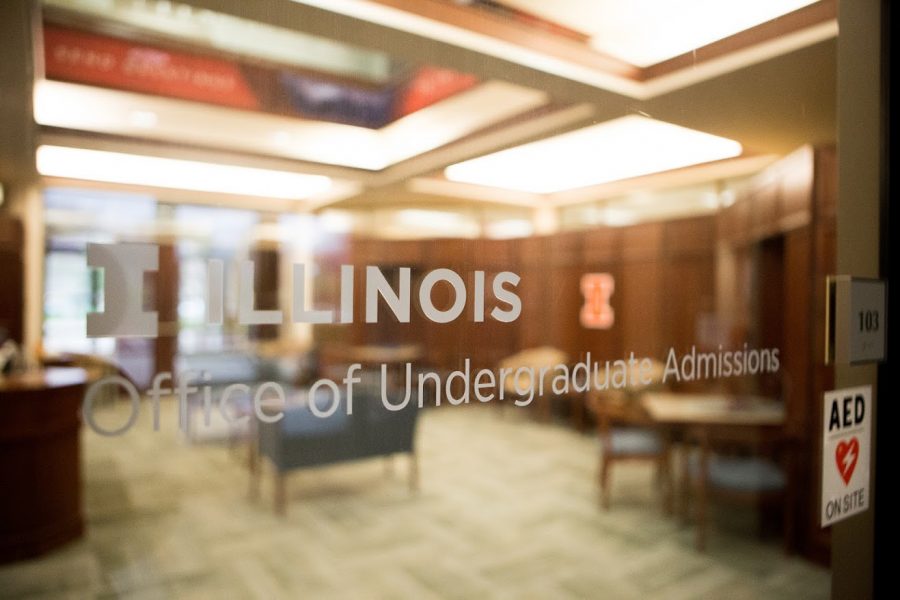University financial aid scandal underlines modern selfishness
August 4, 2019
The Illinois Promise is the University’s pledge to make college affordable for all of its students. It was instituted in 2005 and has since provided thousands of students with the financial aid needed to complete their degrees.
To qualify for I-Promise status, students must demonstrate need: The expected family contribution for their education must equal $0 on their FAFSA forms, and their family must have less than $50,000 in available assets.
Imagine: You are a high school senior. You have poured your existence into your schoolwork, always electing to study for that big test instead of partying, completing every homework assignment instead of wasting your nights on Netflix, and working weekends to save for college instead of attending Khalid concerts with friends.
You’ve done everything right, and you’ve worked so hard. But, looking into the price of higher education, you realize you still can’t afford tuition costs.
Your parents barely graduated high school, and neither has a degree. They want the best for you and wish they could help pay for your school, but between putting food on the table for you and your siblings, clothes on your back and a roof over your head, they just can’t. Their combined five jobs don’t even bring in $60,000 a year.
Get The Daily Illini in your inbox!
You reluctantly prepare yourself for a life of waiting tables and bagging groceries.
Then, your high school counselor tells you about the I-Promise program at the University of Illinois. You let yourself hope. Maybe your life will be more than cheap restaurants and grocery stores.
You apply to the University and submit your FAFSA form eagerly. This is going to happen for you. You’re going to be the first in your family to pursue a degree.
Anxiously, you await your acceptance letter. When it finally arrives, you rip it open and your heart jumps. You’ve been accepted! But then, reading further, you see it. The University regrets to inform you they will be unable to provide you with financial aid. You’ve been beat out for the money by students with better ACT scores and more diverse backgrounds. But what you don’t know is a few of them didn’t need the money.
Your heart sinks, defeated. You pick up your apron and trudge off to your job.
Recently, the admissions office uncovered a loophole certain affluent students have exploited to gain financial aid.
According to ProPublica Illinois, Andy Borst, director of undergraduate admissions, discovered the abuse of the system when a high school counselor from a wealthy Chicago suburb contacted his office to inquire as to why a student had received an invitation to a low-income orientation. Suspicious, Borst looked into the situation and found a shocking way to circumvent the scholarship’s restrictions.
In a selfish and misguided attempt to force their students to match the eligibility criteria for I-Promise aid, parents legally give up their teenagers. They hand guardianship over to another relative or friend and then the student fills out some paperwork to declare themselves financially independent of their parents.
The admissions office suspects at least three students of using this loophole to fraudulently acquire I-Promise aid this past year and has flagged eleven incoming students as guilty of the same deception.
People need to realize their actions can have profound impacts on the lives of others, even those they’ve never met. The financial aid available is heartbreakingly finite. Every dollar awarded to a student is a dollar that cannot be awarded to another.
Families who have the means to afford higher education for their students have no business taking opportunities away from those that do not just so their students don’t have to incur any debt.
Newsflash: College costs money. Students will incur debt to pay for it. The average college graduate in 2018 had $29,800 in student loan debt. I am not saying it’s OK, but it’s the reality.
There are ways to reduce this burden, of course, and in a much less despicable manner than conning financial aid out of the University and taking it away from someone who really needs it. Outside scholarships, for one, are a great way to knock a couple a g’s off your college cost. Getting a part-time job is another. Certainly, committing fraud isn’t your only option.
Shame on those who have already taken advantage of this loophole. Such selfishness cost fourteen prospective students their futures. Hope saving the dollar was worth it.
Lucas is a senior in LAS.







